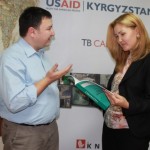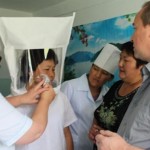
In Kyrgyzstan, where the prevention, detection and treatment of tuberculosis is a major public health concern, new methods of patient-centered care are being developed to combat the disease. With the support of the USAID-funded TB CARE I project, the Kyrgyz National TB Program has begun piloting full outpatient care, allowing TB patients to be treated without hospitalization. The pilot, currently involving 72 patients, is taking place in the urban setting of Bishkek, the country’s capital, with the treatment success rate 86%.

Despite increased investment in tuberculosis (TB) prevention and treatment over the last decade, the National Tuberculosis Program (NTP) and policymakers in Kyrgyzstan were not directing sufficient attention to infection control (IC). The number of infections acquired by patients and health care workers in hospitals and other health care facilities was an indicator of the problem. In 2011 alone, 42 health care workers contracted TB and in 2012 the number of cases increased. Moreover, outdated regulations were contributing to delays in TB diagnosis and treatment. The seriousness of the situation finally forced Kyrgyz authorities to address long-overdue revisions to national IC policies and practices, with assistance from the USAID-funded TB CARE I project.

Thanks to the Women’s Peace Banks Project, the two women of different nationalities continue to work together and help build community trust demonstrating that ethnic Kyrgyz and Uzbeks can be good friends and work together supporting each other in everyday life.

For over a decade, the Government of the Kyrgyz Republic has attempted—largely unsuccessfully—to enhance security and earn citizen trust through meaningful police reform. Like other post-Soviet states, the Kyrgyz Republic inherited a large police structure that has, since independence, been used to suppress dissent—frequently through the intimidation of opposition politicians, media and civil society. Now, however, the status quo appears to be changing.

One of the key challenges to democracy in the Kyrgyz Republic is corruption in state institutions. Closed-door decision making prevents citizens from holding their leaders accountable. Although former President Roza Otunbaeva sought to combat this problem by establishing public councils in state bodies, the sustainability of these independent, diverse citizen oversight groups was unsure because the decree could be reversed by any future president.








Comment
Make a general inquiry or suggest an improvement.